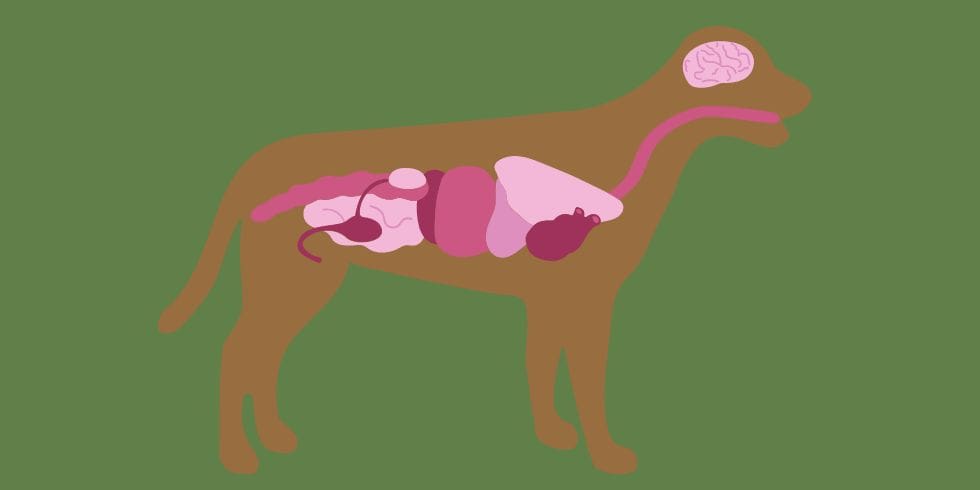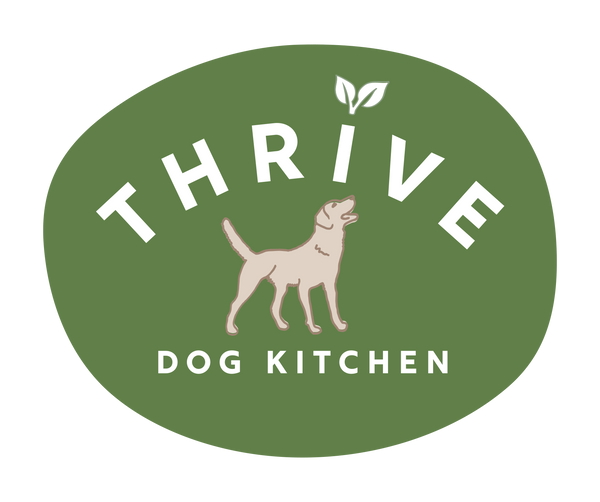
The Dog Gut Microbiome: How to restore and improve it naturally
Share
This might be tough love, but you NEED to hear this...your dog’s gut health maybe be in poor condition in comparison to their ancestors the wolf.
Why? Because generations of dogs before your dog survived on non-species appropriate foods, highly processed diets, been exposed to high levels of stress, anxiety, pollutants and more, which have negatively impacted your dog and the dogs before them.
Thus, looking after your dog’s gut health, aka, their microbiome, is critical to their health and well-being.
Dogs are a resilient species, both physically and mentally. While they are known to be scavengers and opportunistic feeders it does not mean that they will thrive eating everything and anything. There are steps you can take to strengthen their gut microbiome which is essential in your dog thriving, not just surviving.
What is the microbiome?
Did you know that like your own body, your dog’s body is full of thousands of different types of microoragnisms, like bacteria, fungi and viruses that form a diverse community called the microbiome?
While the microbiome isn’t often talked about, many consider it the lost organ.
The microbiome naturally lives on and inside your dog bodies with the majority residing in their digestive tract.
Your dog’s body produces both good and bacteria which either help or hinder the proper functioning of their body.
Your dog’s microbiome is unique to itself, just like our fingerprints. Their microbiome will be affected my many things including age, breed, lifestyle and more.
Building a healthy microbiome for your dog is about restoring balance through building up the good bacteria and ridding the body of bad bacteria.
Why is a healthy microbiome important?
The microbiome helps your dog in an abundance of ways. As more scientists study the microbiome they discover new ways it supports your dog.
- Helps your dog digest food
- Helps your dog absorb the nutrients from the foods they eat
- Supports their immune system
- Protects against the bad bacteria that cause disease
- Helps balance their mental state of mind
- Vitamins that help blood coagulate are produced in the gut with good bacteria
The more diverse the gut microbiome, the better it is for your dog’s health. How does one achieve this? A key factor is eating a variety of foods in their diet.
What can harm the Microbiome?
There are three areas that will impact the balance of yours and your dog’s microbiome.
- Food - The food your dog eats plays a critical role in the balance of their microbiome. Eating the same ultra-processed foods everyday of their lives increases the chance of their micriobiome being out of balance.
Dogs and cats are given processed food their whole lives. From my recent studies, I can’t thinkg of anything worse for a microbiome than feedign high-starch, highly processed, non-diverse foods to any animal for sustained periods of time. This will reduce the number of microbial species in the gut, affect gene expression and reduce the numbers of enzymes and metabolites. And that affects the immune system. The immune system is what stops allergies and cancers.
Photo Credit / Peter Shiazza
- Medication - When your dog takes antiobiotcs they not only kill harmful bacteria, but also kill the beneficial ones. While sometimes antiobioticss are a must, there’s a lot you can do to support and protect your dog’s gut health before, during and after treatment.
- Environment - Everyday your dog steps outside or inside they encounter a number of environmental factors that may affect their microbiome.
- environmetal chemicals
- fertilisers
- contaminated water
- stress
- trauma
Balanced Gut Microbiome
When your dogs gut microbiome is balanced it supports the proper functioning of their body.
-
- Maintain healthy poops
- Support healthy skin
- Support immune system
- Support oral health
- Support the healthy function of the gastrointestional tract
- Support mental health
Imbalanced Gut Microbiome
But, when your dog’s gut microbiome is out of balance this may lead to them developing undesirable health problems, in particular dysbiosis and leaky gut syndrome.
- Diarrhea and constipation
- Skin issues
- Immune issue
- Bad breath
- Poor function of the gastrointestional tract
- Poor mental health
How do you support your dog’s gut microbiome?
There are many different things you can do to support and improve your dog’s gut health.
Feed a species appropriate diet
Dogs that eat a species appropriate diet of fresh whole foods are known to have a more diverse microbiome, which is key to proper gut health. Even if you are not able to feed your dog 100% species appropriate there are simple, yet effective steps you can take to incorporate more fresh foods into your dogs diet.
Probiotics
Probiotic rich-foods or a probriotic product will help restore your dog’s microbiome. Be aware not all probiotic products are created equal as it is considered a supplement, which is an unregulated industry. My preference is to feed probiotic rich-foods including:
-
- Fermented vegetables
- Kefir
- Yogurt
- Goat milk
- Apples
- Seaweed
- Chia seeds
Prebiotics
Probiotics need prebiotics to feed the good bacteria in the gut, otherwise they will die. Like probiotics you can feed a prebiotic rich-foods or a prebiotic product.
- Mushrooms
- Chicory root
- Garlic
- Burdock root
- Dandelion greens
Reduce drug use
Antibiotics in particular - While there are times when your dog requires medication always ask your veterinarian if there are alternative options. When non-medicinal options are not available support your dogs gut health with feeding them probiotics and prebiotics.
Avoid pesticides, fungicides, herbicides
You cannot control the environmental elements your dog comes into contact outside of your home, you can certainly aim to reduce or eliminate any of the -cides used. If you use a fertiliser in an area that your dog has access to regularly wash their paws and their whole body (if they roll around) with warm soapy water or a shampoo specific for dogs.
Research in the microbiome is still in its infancy, but there is enough information that shows the importance of this lost organ for overall health. To learn more about curent research check out any of the below studies.
-
The effects of raw-meat diets on the gastrointestinal microbiota of the cat and dog: a review
- Analysis and comparison of the wolf microbiome under different environmental factors using three different data of Next Generation Sequencing
-
Learning machine approach reveals microbial signatures of diet and sex in dog
